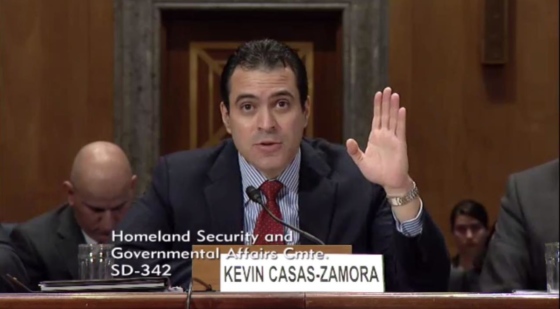IACHR Report on Citizen Security & Human Rights
Citizen security remains a top concern for most Latin American governments as crime and violence spiral out of control and cripple political and economic institutions in the region.
This post is also available in: Español
Citizen insecurity and illicit economies are serious issues in Latin America and the Caribbean (LAC), prompting urgent demands from the public for solutions. In response, mano dura policies have been implemented, which have reduced violence but at a significant cost to the rule of law and human rights. It is necessary to develop and promote alternatives that are both effective and democratic. This was the focus of an event organized by the Inter-American Dialogue's Rule of Law Program, International IDEA and Ágora.
LAC is among the most violent regions globally. "A third of the world's homicides occur in Latin America, and 39 of the 50 most violent cities in the world are in LAC," noted Kevin Casas-Zamora, secretary general at International IDEA. This has led to a willingness among the region's population to sacrifice the rule of law for solutions to citizen insecurity, as seen in El Salvador. Despite this, Casas-Zamora highlighted that there are successful examples in LAC where violence reduction has not compromised democratic principles and the rule of law, such as in Bogotá and São Paulo. These cases involved police reforms, intensive data use, improved police-community relations, substantial social investment, and territorial recovery. "While sustainable solutions to citizen insecurity require long-term investment, we must also propose solutions that deliver visible short-term results," he added.
The region's security is particularly compromised by the expansion of drug trafficking and illegal economies. Juan Pablo Luna, professor in the School of Government at the Catholic University of Chile and a member of Ágora, pointed out that various models implemented in the region to tackle these issues, such as Bukele's mano dura, the political-police management in Rosario, Argentina, and drug liberalization in Uruguay, are not sustainable. Regarding the former, he noted, "In cases where mano dura measures have been applied, such as in Mexico and Brazil, we have seen a surge and escalation of violence following these measures, along with increased corruption."
Despite the popularity of the mano dura model in the region, replicating it depends on several factors. Tamara Taraciuk Broner, director of the Dialogue's Rule of Law Program, emphasized the importance of the context in which these measures were adopted and the communication strategy behind the model. "Bukele was able to implement his security measures because he had already undermined democratic institutions in El Salvador," she added. Furthermore, Taraciuk Broner mentioned that Bukele's model involves a significant investment in communication. "Bukele not only achieves violence reduction results but also knows how to effectively communicate them domestically and internationally," she stressed.
Finally, the insecurity in the region poses significant challenges to electoral processes. "The first challenge is the penetration of illegal economy actors into politics, the second is related to illegal political financing, which distorts election competition and risks state capture, and the third is targeted violence against candidates during campaigns, as seen in Mexico, Colombia, and Ecuador," emphasized Marcela Ríos Tobar, director for Latin America and the Caribbean at International IDEA.
Citizen security remains a top concern for most Latin American governments as crime and violence spiral out of control and cripple political and economic institutions in the region.
In El Salvador, a large population is incarcerated in jails that function more like “torture chambers.”
This post is also available in: SpanishCONGRESSIONAL TESTIMONY AS SUBMITTED FOR RECORD AND DELIVERED BEFORE A FULL COMMITTEE HEARING OF THE US SENATE COMMITTEE ON HOMELAND SECURITY AND GOVERNMENT AFFAIRS. Over the past five years, slightly over 100,000 unaccompanied migrant children from Guatemala, Honduras and El Salvador have been apprehended at the…
 Inter-American Dialogue
Inter-American Dialogue
 Video
Video
 Video
Video